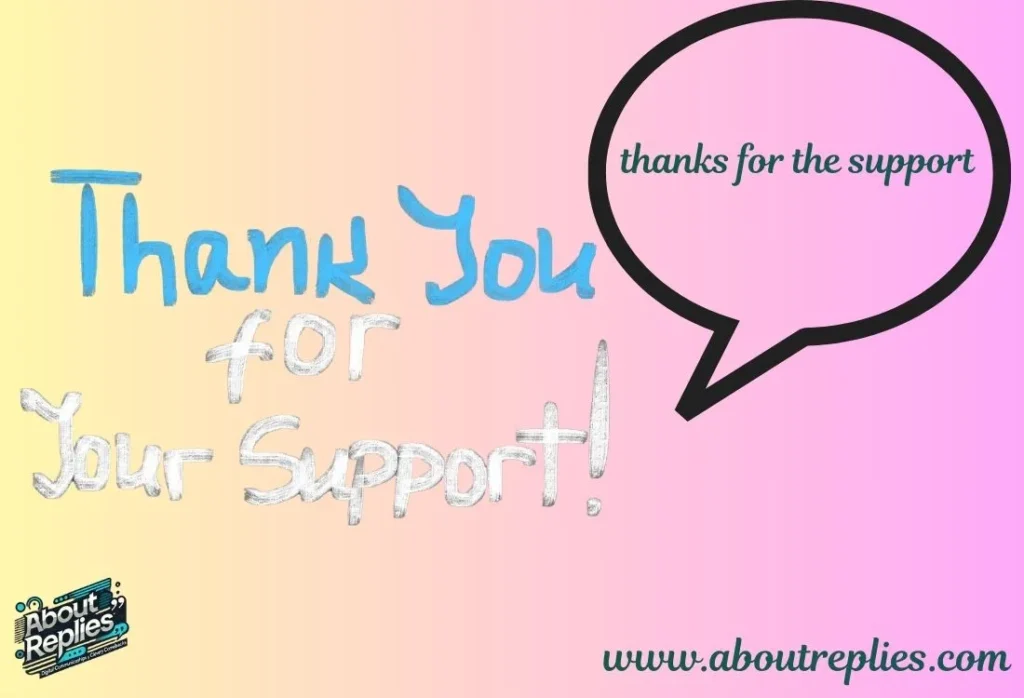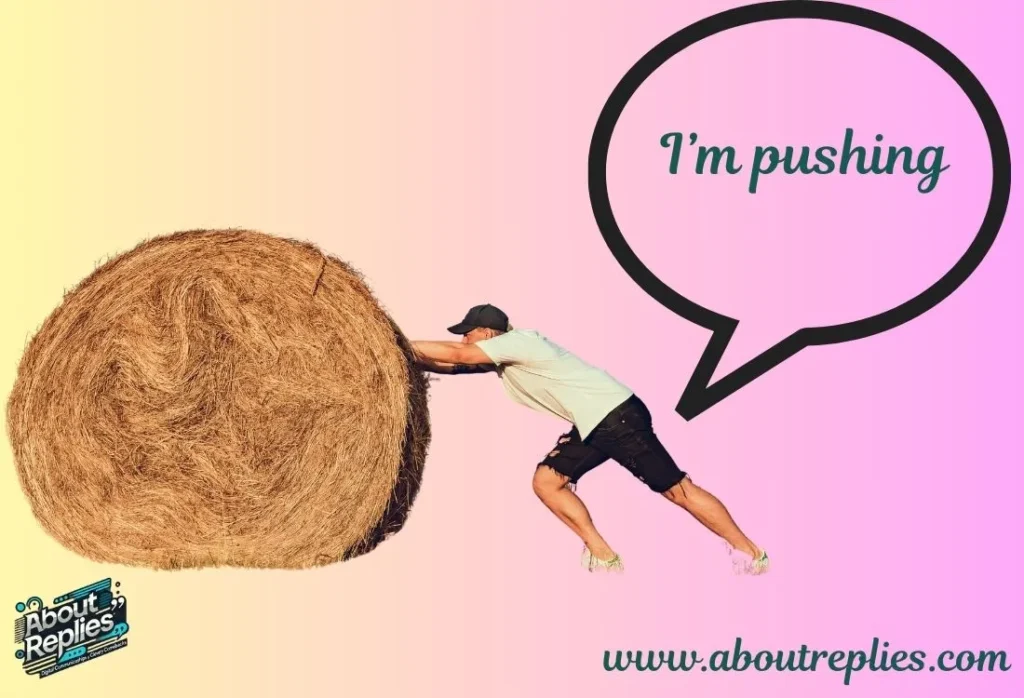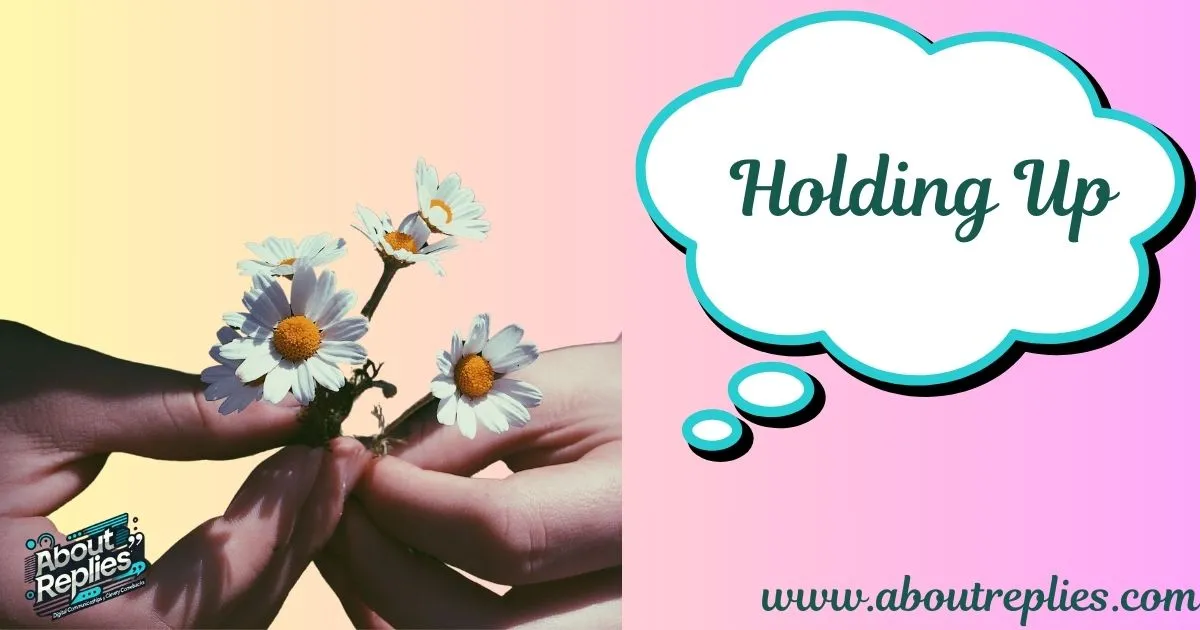“Life can be challenging, and we all need support during tough times. How we check in with each other can make a big difference.“
In life, we often find ourselves asking the simple yet powerful question, “How are you holding up?” It’s a phrase that reflects care, concern, and a desire to know how someone is coping with the stress or challenges they might be facing. You’re dealing with personal struggles or offering a helping hand to a friend, knowing the right way to respond can strengthen relationships and foster deeper connections.
In this blog post, we’ll explore 98+ replies to “How are you holding up?” that will help you navigate various conversations with empathy and support. You’ll find responses suited for all kinds of situations, offering a mix of positivity, humor, honesty, and professionalism.
By the end of this article, you will have a comprehensive list of 98+ replies that are ready for you to use in your daily interactions. This collection of responses will help you be more empathetic, you’re checking in on a friend, coworker, or family member. The next time someone asks you, “How are you holding up?”, you’ll know exactly what to say to keep the conversation flowing and leave a positive impact.
Responding to “How are you holding up?” isn’t just about giving a quick answer; it’s about understanding the emotions behind the question. Sometimes, people just want to know that you care, while at other times, they may be looking for an honest reflection of how things are going in your life. In this article, you’ll learn how to craft responses that are genuine, thoughtful, and appropriate to the situation. From lighthearted, humorous replies to more serious, encouraging answers, we’ve got you covered with a wide range of options to ensure you’re prepared for any scenario.
Positive Responses
Positive responses convey an optimistic or upbeat outlook. These are useful when you want to show that you’re feeling great and uplift the mood of the conversation. Whether you’re replying to a friend, family member, or colleague, a positive response sets a good tone for the interaction.
- I’m doing great, thanks for asking!
A cheerful way to show that everything is going well in your life. - Everything’s looking up on my end!
Shows that things are improving in your life, even if things were tough earlier. - Feeling better than ever, appreciate you checking in.
A response indicating that you’re feeling at your best, often used after a recovery period. - All good here, how about you?
A positive reply, plus it shows interest in the other person’s situation. - I’m hanging in there, staying positive!
A positive response that acknowledges challenges but shows you’re staying optimistic. - Life’s treating me well, thanks for asking!
A way to express gratitude for things going well in your life. - Things are really looking up these days.
A way of saying things are improving, even if slowly. - Couldn’t be better!
A bold, enthusiastic reply indicating you’re doing exceptionally well. - I’m managing well, thanks for the support!
Shows you’re handling things well, with appreciation for the concern.

- Everything’s going smoothly, hope it is for you too!
A positive response that also expresses good wishes for the other person. - I’m feeling strong and optimistic.
Expresses confidence and resilience, despite challenges. - Things are moving forward, slowly but surely!
A steady, positive reply when progress is slow but steady. - I’m staying positive, no complaints!
A simple and upbeat response showing no issues. - I’m doing fine, it’s a new chapter in life.
A positive statement about adapting to change.
Read more: 55+ Funny Roasts to Say to a Bully(2025)
Neutral Responses
Neutral responses are ideal when you don’t want to show too much emotion but still want to acknowledge the question. These replies are balanced, not too high or low, and convey that you’re doing okay.
- I’m holding up okay, how about you?
A neutral reply that also turns the focus back on the other person. - Things are going alright at the moment.
Indicates you’re doing okay, but nothing extraordinary is happening. - It’s been an average day so far.
A simple and balanced reply showing you’re getting through the day, with nothing exciting. - Not too bad, just taking things one day at a time.
A laid-back approach, acknowledging things are steady but not perfect. - Could be worse, could be better.
A balanced response that shows you’re neither thrilled nor troubled. - Just going through the motions, you know?
A casual way to express that you’re just managing, but without excitement. - It’s a mixed bag, but I’m getting by.
Acknowledges that things are both good and bad, but you’re handling it. - Same as usual, nothing too exciting.
Shows that things are normal and unchanging. - I’m fine, nothing to complain about.
A way to say that you’re okay and things are uneventful. - Just trying to get through the day.
Expresses that you’re getting by, but not fully engaged or enthusiastic. - I’m surviving, how about you?
A straightforward reply, signaling that you’re managing but not thriving. - It’s been a calm day, thanks for asking.
A peaceful response showing that nothing out of the ordinary is happening. - Just maintaining, nothing special.
A simple reply showing that you’re managing and things are staying steady. - Things are steady, no big changes yet.
Indicates stability without any major improvements or setbacks.
Honest Responses
Honest responses are perfect when you’re going through a tough time and don’t want to hide your struggles. These answers show vulnerability but also convey your determination to get through the rough patches.
- Honestly, it’s been a rough patch, but I’m getting through it.
A candid response admitting things are tough but you’re coping. - I’ve been better, but I’m pushing through.
A response that shares you’re not at your best, but you’re determined to carry on. - To be honest, it’s been a tough week.
A straightforward reply indicating that the week has been challenging. - It’s been challenging lately, but I’m hanging in there.
A truthful reply acknowledging struggles but showing perseverance. - I’m not doing great, but I’m surviving.
A raw, honest response that admits you’re not doing well but you’re managing. - I’ve been struggling a bit, but I’m trying to stay strong.
A response that shows you’re facing difficulties but focusing on your strength. - I’ve had better days, but I’m managing.
A response acknowledging tough days, but showing resilience. - I’m dealing with some personal stuff, but it’s getting better.
A transparent reply that shows you’re facing personal challenges but progress is being made. - I’m not feeling my best, but I’m staying hopeful.
A vulnerable response indicating that you’re not okay but staying positive. - It’s been hard, but I’m trying to stay focused.
An honest reply that shows you’re struggling but staying focused on your goals. - Things have been tough, but I’m not giving up.
A determined response showing that you’re facing adversity but not backing down. - Life’s been throwing some curveballs, but I’m still standing.
A candid response that shows you’re handling unexpected challenges. - It’s been a lot to handle lately, but I’m pushing through.
A response admitting stress and struggle but highlighting perseverance.

- Honestly, I’m just taking it day by day.
A transparent response showing you’re coping one step at a time.
Humorous Responses
Humorous responses lighten the mood, showing you can laugh through tough times or simply want to add some fun to the conversation. They help create a positive atmosphere, especially in casual or friendly conversations.
- I’m surviving on coffee and hope!
A humorous way to show you’re getting through life with minimal fuel. - I’m hanging in there like a cat on a curtain.
A playful, funny way to show you’re hanging in there despite challenges. - I’m good, just waiting for the weekend to show up!
A lighthearted reply showing you’re fine, but looking forward to a break. - My mood’s as unpredictable as the weather.
A funny, relatable reply indicating you’re a bit up and down. - I’m holding up like a superhero… minus the cape.
A funny way to show you’re managing, but without all the superpowers. - I’m fine, just trying to remember what day it is.
A humorous reply expressing confusion and stress in a playful manner. - I’m doing well, just trying to avoid adulting today!
A funny way of saying you’re good, but would rather not deal with responsibilities. - Everything’s fine… well, for now!
A humorous response indicating that while everything is okay, it might change at any moment. - I’m good, but I think I’ve aged five years in the past week.
A funny reply showing stress but in a lighthearted way. - I’m holding up like a snack on a bad day.
A playful response showing you’re managing, even if not at your best. - Things are going great, just need more sleep!
A humorous way to show you’re good but could use a bit of rest. - I’m hanging in there, just like a Wi-Fi signal in a basement.
A funny response showing you’re managing, but not perfectly. - I’m doing well, but I could use a vacation.
A humorous way to show you’re good but would appreciate a break. - Surviving, barely, but surviving!
A funny way to admit you’re hanging in there despite challenges.
Professional Responses
Professional responses are ideal when you want to keep things formal or if you’re responding to a colleague or supervisor. These replies show that you’re doing well and staying on top of things in a business context.
- I’m doing well, staying focused and productive.
A professional response that shows you’re focused and on track with work. - Things are going smoothly, keeping a steady pace.
Indicates everything is under control, without any issues. - I’m managing well, thanks for asking.
A simple and polite reply indicating you’re handling things fine. - It’s been a productive week, keeping up with deadlines.
A professional way to show you’re working hard and staying on top of tasks. - Things are progressing as planned, thank you for checking in.
A confident reply showing that everything is on schedule and going as planned. - I’m keeping up with my work, no complaints.
A professional way to say you’re handling your workload without issues. - Things are moving forward, staying professional as always.
Indicates progress and maintaining a professional approach. - Everything’s on track, I’m staying on course.
A positive, professional reply that shows things are progressing as planned. - I’m handling everything well, just staying organized.
A reply that shows you’re managing multiple tasks efficiently. - Things are going according to plan, thank you for your concern.
Reassures that everything is fine and under control. - I’m doing fine, just tackling my to-do list.
A simple, professional reply indicating you’re staying busy and focused. - I’m staying focused and motivated, thank you.
A response showing determination and enthusiasm for your tasks. - Things are going according to plan, thank you for checking in.
A confident reply showing you’re on track. - Everything’s in motion, staying efficient and productive.
A professional way to indicate you’re actively working and progressing.
Appreciative Responses
Appreciative responses are thoughtful and show gratitude toward the person who’s asking how you’re holding up. These responses help acknowledge the kindness or concern of others while expressing your thanks.
- Thank you for checking in, I’m doing well.
A polite and appreciative reply that shows you value the person’s concern. - I really appreciate you asking, things are good on my end.
Shows appreciation while also sharing that everything is fine. - It means a lot that you care, I’m handling things.
A heartfelt way to express gratitude for the person’s thoughtfulness. - Thanks for reaching out, I’m staying positive.
A response that thanks the person for their inquiry while indicating you’re in a good state. - I appreciate you thinking of me, things are going smoothly.
Shows gratitude and reassurance that everything is fine. - Your concern means a lot, I’m doing alright.
A gentle reply that conveys both gratitude and your current state. - Thanks for the support, I’m feeling good.
A warm response showing appreciation for the person’s kindness. - I’m doing well, I really appreciate you checking in.
A simple way to express gratitude while sharing that you’re fine. - Thank you for your kindness, I’m managing just fine.
A polite and appreciative reply, expressing thanks for their concern. - I’m holding up well, thanks so much for asking.
A response that shows both appreciation and assurance that you’re doing okay. - I’m grateful you asked, I’m staying calm and focused.
A response showing that you appreciate the other person’s care while indicating that you’re handling things. - Your support means a lot to me, I’m doing alright.
A heartfelt response expressing both gratitude and that you’re managing. - I’m doing fine, thanks for your thoughtful inquiry.
A polite and appreciative reply acknowledging the person’s kindness. - I truly appreciate your check-in, I’m staying steady.
A response that shows gratitude while also reassuring the person that everything is going well.
Encouraging Responses
Encouraging responses are ideal when you want to uplift someone’s spirits and offer motivation. These responses are supportive and help provide reassurance, showing that you’re ready to face challenges and stay positive.
- I’m doing well, and I know things will only get better!
An optimistic response that motivates both you and the person asking. - Thanks for checking in, I’m pushing through and staying strong!
An encouraging response showing you’re determined to stay resilient despite challenges. - I’m holding up just fine, and I believe things will improve soon.
An encouraging reply that inspires hope for better days ahead. - I’m doing great, just taking it one step at a time!
A motivational response that emphasizes staying calm and focused on small, manageable tasks. - I appreciate you asking, and I’m confident I’ll get through this.
A reply that expresses gratitude and reassures that you have the strength to cope. - I’m staying positive and keeping my head up—things will turn around!
An encouraging response that promotes optimism and perseverance. - It’s been tough, but I’m staying strong and ready for whatever comes next!
A motivating reply showing you’re facing challenges head-on with confidence. - I’m holding up well, and I’m confident I can handle whatever comes my way!
A response that shows you’re prepared to face any obstacles with a positive mindset. - Thanks for asking, I’m going through it, but I’ll make it through stronger!
An encouraging reply that acknowledges the struggle but emphasizes resilience and growth. - I’m doing well, and I know that challenges are just opportunities in disguise!
A response that frames difficulties as opportunities for growth and success. - I’m feeling good, and I know every setback is just a setup for a comeback!
A motivational reply that reinforces your belief in overcoming challenges. - I’m staying focused and determined, and I know things will get better soon!
A reply that shows your commitment to staying focused and hopeful for a positive outcome. - Things are tough, but I know I’ve got what it takes to keep going!
An encouraging response that shows self-confidence and determination. - I’m holding strong, and I’m ready to tackle whatever comes my way!
A strong, positive reply that emphasizes your readiness and resilience.
“How Are You?” Is a Common Greeting
- A Universal Greeting: Commonly used in many cultures to start a conversation.
- Not Always Literal: Often used as a courtesy rather than a request for detailed information.
- Varied Meanings: Can imply concern, interest, or politeness depending on context.
- Cultural Nuances: The tone and usage can vary across regions.
- Formal vs. Casual Use: More casual with friends, formal in professional settings.
- Non-Verbal Cues: Facial expressions and tone can change its meaning.
- Common Replies: Answers like “I’m fine” or “Good” are standard.
- Politeness Rule: Asking back, “How about you?” is polite.
- Icebreaker: A conversation starter that often leads to deeper topics.
- Overused Phrase: Some people find it lacks genuine intent.
Describe Your Situation in Detail
- Shows Vulnerability: Sharing details can foster deeper connections.
- Context Matters: Explaining your situation helps the other person understand better.
- Emotional Support: Provides a chance to receive help or advice.
- Building Trust: Detailed sharing encourages openness.
- Better Communication: Reduces misunderstandings.
- Professional Scenarios: Essential in work-related updates or health consultations.
- Therapeutic Value: Talking about challenges can be emotionally relieving.
- Tailored Responses: Helps the listener give meaningful input.
- Avoids Miscommunication: Prevents vague or unclear assumptions.
- Not Always Necessary: Balance sharing depending on the situation.
Understanding the Phrase “How Are You Holding Up?”
- Used in Tough Times: Often asked during crises or difficult periods.
- Shows Empathy: Reflects genuine care for someone’s well-being.
- Invites Honesty: Encourages open communication about struggles.
- Acknowledges Challenges: Indicates awareness of someone’s hardships.
- Non-Intrusive Check-In: Lets the other person share as much as they want.
- Tone Matters: A kind tone makes the question comforting.
- Common in Close Relationships: Asked by family or close friends.
- Response Can Vary: Answers may range from brief to detailed.
- Positive Reinforcement: A chance to offer support and encouragement.
- Therapeutic Opening: Can lead to discussions that lighten the emotional load.
Brief Responses
- “I’m fine, thanks.”: The most common polite reply.
- “Doing okay.”: Neutral and concise.
- “All good here.”: Indicates positivity.
- “Could be better.”: Suggests slight struggles.
- “Not bad.”: Casual and relaxed response.
- “Hanging in there.”: Often used during stressful times.
- “I’m good.”: A casual affirmation.
- “It’s been a day.”: Suggests the day has been challenging.
- “Same old.”: Implies nothing new or exciting.
- “Thanks for asking.”: Appreciative but short.
Direct Responses
- “I’m doing great!”: Shows enthusiasm.
- “Not doing well.”: Directly states struggles.
- “I’m stressed but managing.”: Honest about pressure but optimistic.
- “Feeling happy today!”: Shares positive emotions.
- “I’m a bit overwhelmed.”: Acknowledges current challenges.
- “Having a rough day.”: Expresses the difficulty plainly.
- “I’m energized and ready!”: Reflects excitement or readiness.
- “Feeling under the weather.”: Indicates minor health issues.
- “Tired but okay.”: A common honest response.
- “I’m handling things well.”: A balanced and optimistic reply.
Open Responses
- “Thanks for asking, how about you?”: Polite and reciprocal.
- “It’s been an interesting day.”: Encourages curiosity.
- “I have a lot on my plate right now.”: Opens a discussion about challenges.
- “I’m feeling great! What about you?”: Positive and inviting.
- “I’ve been thinking about something exciting.”: Sets up a positive topic.
- “Honestly, it’s a bit complicated.”: Invites empathy and further dialogue.
- “I’m feeling reflective today.”: Introduces a thoughtful tone.
- “I’ve been better, but I’m managing.”: Balanced and conversation-friendly.
- “I’m excited about something new!”: Encourages a chat about positivity.
- “Let’s talk about how you’re doing first.”: Shifts focus to the other person.
Reflective Responses
- “I’m grateful for today.”: Reflects gratitude.
- “It’s been a tough but rewarding week.”: A mix of struggles and accomplishments.
- “I’ve been learning a lot about myself.”: Reflective and personal.
- “I’m feeling both hopeful and anxious.”: Expresses mixed emotions.
- “I’ve been thinking about what’s next in life.”: Encourages a meaningful discussion.
- “It’s been a rollercoaster of emotions.”: Honest and descriptive.
- “I’ve had some wins and losses recently.”: Balanced self-assessment.
- “I’m trying to focus on the positives.”: Reflective optimism.
- “It’s a season of growth for me.”: Highlights personal development.
- “I’m finding peace in small things.”: A thoughtful and uplifting response.
Frequently Asked Questions
- How can I reply to “How are you holding up?” in a professional setting?
You can respond with, “I’m managing well, thank you for asking,” or “Things are progressing smoothly, I’m staying on top of my tasks.” - What are some humorous ways to respond to “How are you holding up?”
You can say, “I’m surviving on coffee and hope!” or “I’m hanging in there like a cat on a curtain!” - What should I say if I’m not feeling well?
It’s okay to be honest! You could reply, “I’ve been better, but I’m pushing through” or “It’s been tough, but I’m staying hopeful.” - How can I respond if I’m doing great?
A positive reply could be, “I’m doing great, thanks for asking!” or “Everything’s looking up on my end!” - What are some thoughtful responses to “How are you holding up?”
You can reply with, “I’m doing well, thanks for checking in,” or “I appreciate you asking, I’m managing just fine.”
Wrap Up
In conclusion, responding to the question, “How are you holding up?”, is more than just a casual exchange it’ s a chance to show empathy, offer support, and strengthen your connections with others. You’re feeling positive, neutral, or struggling, there’s always a perfect response to match your mood and the situation. By using the right response, you can convey your feelings, maintain conversations, and build a deeper connection with those around you.


